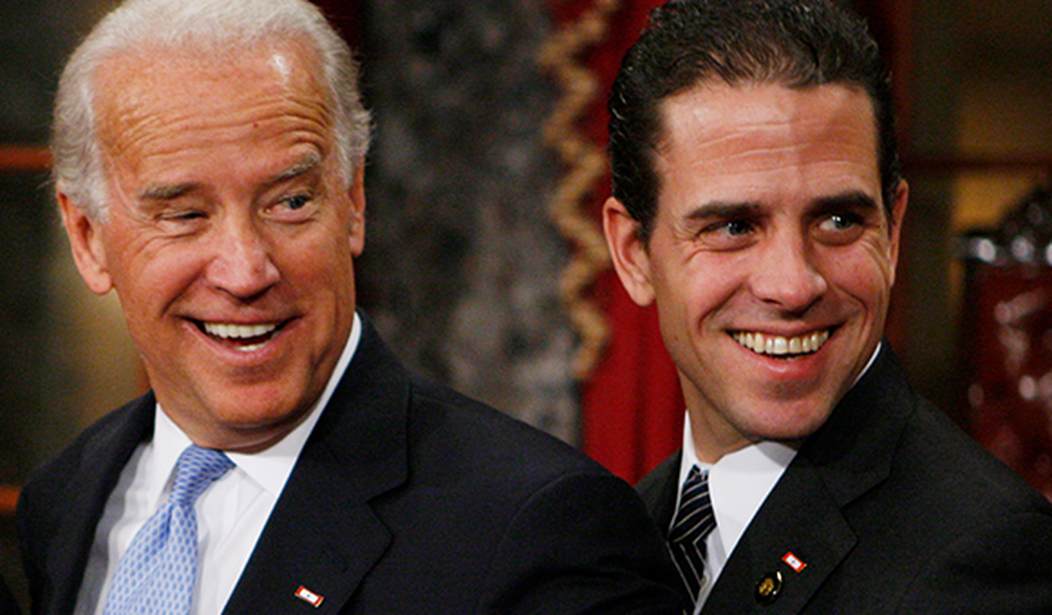I seem to spend a lot of time on Twitter trying to disabuse people of mistaken notions about how the federal legal/investigative process works in practice, and why it is often a mistake to expect instant attention or action from a process that doesn’t lend itself to such demands.
The search of a laptop obtained by means other than a search warrant is one such process about which many people jump to conclusions that are unwarranted, and aren’t informed by the requirements of the case law interpreting the Fourth Amendment.
Yesterday Fox News reported that the laptop had been subpoenaed by the grand jury as part of a “money laundering” investigation, and that set “tongues a waggin” as they say.
The Biden campaign then issued a statement turning daytime into night by claiming that Fox’s report confirmed that the FBI was actually investigating Rudy Giuliani because — don’t ya know — if you paid for, or receive payment for, fraudulent information that’s used in an election campaign that might be “money laundering”. Since that’s why the FBI took the laptop, it can only mean that Giuliani is being investigated because he’s been targeted by the Russians to help perpetrate their fraud against the Joe Biden.
With all due sincerity, everyone needs to SHUT UP if you don’t have experience in this process. Too many idiots are making stuff up based on the way they THINK the process works and then using their made-up scenarios to spin the fact that the FBI used a grand jury subpoena to take possession of the laptop.
On the heels of those baseless comments, we have another whole corner of Twitter who is convinced the FBI took the laptop for the sole purpose of burying it and keeping its contents out of the election, and they draw a parallel with the handling of Anthony Weiner’s laptop by Peter Strzok in the fall of 2016.
Once again, fact-free scenarios being spun out on keyboards in a “free association” style of taking a Rorschach test, combining mixed metaphors of conspiracy theories.
Those of you engaged in these exercises are making as much sense as that last sentence of mine.
With regard to Hunter Biden’s laptop, we know it came into the possession of the FBI pursuant to a grand jury subpoena given to the computer repair shop owner on September 9, 2019.
We also know that the Agent who picked up the laptop had at least one telephone call or in-person conversation with the computer shop owner because the subpoena identifies the laptop by serial number in the description of “items to be produced.”
What we do not know is what happened with regard to the laptop after that. There is a belief being expressed across the internet that nothing was done, and that was by design. But no one knows that for sure.
I can’t disabuse those who have it of the notion that the FBI and federal prosecutors always act in accordance with some pre-determined political motivation. It’s ridiculous to have that belief based on a few highly “irregular episodes,” and then smear it across a workforce of 12,000+ FBI agents and 4000+ prosecutors to conclude they are all “in on it” and that explains everything that happens which you don’t agree with.
Nor am I going to try to argue that the “irregular episodes” aren’t troubling on their face, and raise questions about how much the leadership in the DOJ and FBI have internalized their own political views. I know first hand that is true in DOJ, but I also know that in 99% of the cases leadership doesn’t dictate how an individual case gets handled based on politics.
I will say this — leadership in DOJ and FBI is always acutely aware of the politics of a particular circumstance where there is a significant political angle that applies. But that awareness is almost always part of an effort to not “step on a landmine” and as a result do damage to the case or a career. SOMETIMES, the best way to avoid stepping on such a “landmine” is to not take a step. These are the “damned if you do, damned if you don’t” dilemmas.
Understanding that such a backdrop always exists, regardless of what party is in control of the politics of DOJ/FBI, let’s look at what did — or did not — happen with regard to the laptop obtained from the computer shop owner.
Fox News added some details to the subpoena yesterday by including a picture of the FBI property receipt that was given to the person who delivered the laptop. That receipt has the FBI Case File number on it so we know the investigation to which it relates was listed as a “272D” matter. That is the FBI’s “Violation Code” for “Money Laundering, Unknown SUA.”
Here is where the earth shifted off its axis for some. Suddenly Twitter was on fire with scenarios in which Hunter Biden, Joe Biden, Rudy Giuliani, Donald Trump, Ivanka Trump, Nancy Pelosi, Devin Nunes, Mitch McConnell, blah, blah, blah, were somehow implicated in “money laundering” and the laptop is the key to unraveling everything that has been hidden for so long. Whatever side of the political aisle you’re on dictated who the “target” of the investigation might be. I’m truly in fear of visiting EmptyWheel to see who Marcy Wheeler has positively identified as the guilty party.
But ALL THAT IS WRONG. The designation on the property receipt is — for all practical purposes — useless based on the known information.
A 272D matter is about as “generic” as the FBI can be with regard to an unknown form of white-collar crime. For practical purposes, it serves as a “placeholder” until more information is known. When the case is opened in the case file system, the Agent must include a violation code. The FBI only investigates “crimes” so unless they can describe a crime, no case is opened.
The real clue that the FBI used 272 as a placeholder in this instance is the fact that it was opened as a “D” file — “Unknown SUA” which means “Unknown Specified Unlawful Activity.” That shows the FBI had no information at the time about what underlying criminal activity might be involved.
The crime of “money laundering” may be about the least understood criminal offense that exists, yet it draws the most amateur commentary from people about what people THINK it is — and they are mostly wrong.
“Money laundering” only happens if the “money” involved is derived from criminal activity. But not all criminal activity counts — only “Specified Unlawful Activity” as set forth in a specific federal statute — 18 U.S.C. Sec. 1956(c)(7). If you hit the link, be prepared to have your eyes glaze over.
Money derived for other crimes — not listed among the “SUAs” in the statute — is not subject to the statute criminalizing the financial transaction, commonly referred to as “money laundering.”
My guess is that when they took the laptop with a grand jury subpoena, the computer shop owner didn’t give them much more information than there were financial documents and/or documents that looked like they involved foreign business activities by Hunter Biden. Not having specifics about crimes that might be involved, the Agent opened it as a generic “money laundering” investigation just to be able to take possession of the laptop.
So what happened next? No one knows, and everything you are reading elsewhere is speculation.
But when a computer is obtained via a grand jury subpoena, that does not give the FBI authority to search the hard drive. To do that the Agent needs to get a search warrant.
A federal agent can only seek a search warrant if authorized to do so by a federal prosecutor. The process for getting a search warrant begins with the question “What crime do you think Hunter Biden might have committed?” The second question is going to be “What evidence do you have that he committed that crime?”
Having a suspicion based on what the computer shop owner told the agent is not going to be enough when you are talking about a white collar crime unless the owner printed off documents from the computer, gives them to the FBI, and the documents begin to make the case that criminal activity may have taken place.
That does happen. It’s called a “private party search” and the FBI can use information learned in that fashion to justify getting a search warrant since the information didn’t come from an FBI search. That information can be used to establish probable cause to search the computer for other evidence.
But we don’t know if that happened here. We don’t know how much detail the computer shop owner was able to provide about the files he looked at. But the clue that the shop owner did not give detailed information, nor give documents to the Agent is the fact that the case was opened as a “D” file. It’s likely the fact that the shop owner didn’t copy any of the documents themselves to give to the agents, and/or he didn’t understand them well enough to be able to describe in detail what they were. Without that information, the agent and the prosecutor have a lot of questions but not many answers. That’s how investigations START.
These questions don’t answer themselves. But doing all these tasks, and dealing with the inquiries of a prosecutor, don’t all happen in one sitting and one phone call.
Obtaining a search warrant would have to wait until the Agent and the prosecutor could develop evidence independent of the laptop that Hunter Biden was likely engaged in criminal activity, and evidence of that criminal activity would likely be found on the computer.
Without being able to provide that information to a federal judge, the FBI was not going to get a search warrant for the laptop — unless, as has now happened, various items from the laptop have become public as a result of the shop owner keeping a copy of the hard drive for himself. The FBI can use that public information as a basis to seek a warrant if they had not obtained one up to this point.
THAT is how the process ACTUALLY works.














Join the conversation as a VIP Member